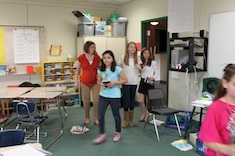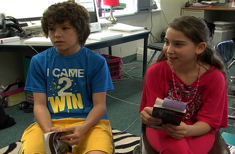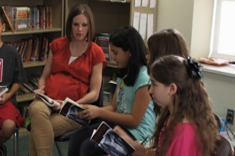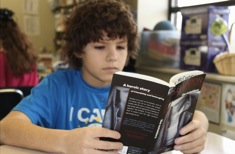Gretchen Taylor
Gretchen Taylor has worked as a middle school teacher for the Dublin (Ohio) City Schools, and a teacher-scholar in the National Writing Project. She currently works as a literacy coach in the district.
All Content
Word Study PD: Building on Strengths
Gretchen Taylor finds teachers are particularly insecure about their ability to lead word study with children. So she begins a professional development session by helping them see how capable they are.
Who Are “They”? Word Choice and Student Learning
Gretchen Taylor finds that these kids and everyone are key words to focus on in coaching, because they can signify sweeping assumptions in lieu of a close look at individual behaviors.
Coaching Purposeful Classroom Design
Gretchen Taylor helps middle school teachers rethink their instruction by considering areas of the classroom as “zones” for learning, and redesigning them accordingly.
Building Self-Evaluation Skills: What’s Your Signature Move?
Signature moves are developed over years, not days. Gretchen Taylor explains how they can define literacy leaders in positive and negative ways.
The Stories We Tell Ourselves
Gretchen Taylor reflects upon a poor relationship she develops with an instructor, and how the narratives we construct can inhibit our professional interactions with colleagues.
After the Demonstration: Modeling Healthy, Sustainable Reflection
Gretchen Taylor considers the role of reflection in learning after demonstration lessons, with specific examples from her work with a teacher.
Erasing the Lines in the Sand
Gretchen Taylor finds that many of us are more opinionated than ever, but literacy coaches will never find a home in classrooms without suspending judgment.
Making Coaching Meaningful: Establishing Goals and Roles
Gretchen Taylor finds that her coaching cycles are much more rewarding for everyone when goals and roles are defined at the start of the process.
Being Present
Gretchen Taylor thinks about the messages we send when we allow ourselves to be distracted by technology in professional settings.
Transition Time in Middle School
Gretchen Taylor considers how she handles hard transitions as an adult, and questions how she can make transitions more efficient and valuable for her middle school students.
Getting Out of the Tater Tot Office: The Importance of Visibility
Gretchen Taylor ponders what literacy coaches can do to make their presence and the possibility of collaboration better known to teachers, focusing on her work in public spaces and on her coaching calender.
Always “On”: Reconsidering Connectivity
Gretchen Taylor writes about the promise and peril of new tech tools that allow teachers, students, and coaches to always be connected. She shares some questions to help teachers make wise choices about how they will use these tools in classrooms.
Refining Reflective Practice and Notetaking
Gretchen Taylor shares three tweaks she has made to her record-keeping system to ensure she keeps her coaching notes organized and useful for reflection.
Building Annotation Skills with Partners
Gretchen Taylor works from homework surveys to help her middle school students collaborate with partners to build annotation skills.
Don’t Confuse the Already Confused
Gretchen Taylor observes the confusion that ensues when different adults, all with the best intentions, work with readers who are struggling.
From Coaching Logs to Coaching Reports
Gretchen Taylor uses her coaching logs to craft coaching reports. These reports are a catalyst for receiving feedback from administrators on her work.
From Worksheets to Workshops
A teacher asks first-year literacy coach Gretchen Taylor to observe and help with a disengaged student. Gretchen discovers in her observation that the issue may be that the literacy curriculum needs an update.
In the Trenches: Reflection, Not Perfection
Gretchen Taylor finds it’s important to suppress her urge to manage students when coaching—and to be honest with teachers about those urges.
Coaching Teachers to Support Gifted Learners
Gretchen Taylor has coaching advice for teachers who are working with a challenging population that is sometimes shortchanged: students who exceed grade-level expectations.
Coaching Logs and Daily Reflective Routines
Gretchen Taylor explains why it's important for coaches to carve out time to use their coaching notes for reflection.
Getting Organized with Google
Gretchen Taylor finds Google is indispensable for keeping her literacy coaching work organized. She explains how she uses Google for everything from surveys to collaborating with teachers.
Breaking Away from the Team
Literacy coach Gretchen Taylor is stymied by a grade-level team with one dominant member. She needs to find creative ways to separate individual teachers from the "group-think" herd to guide and collaborate effectively.
Failure to Norm
Gretchen Taylor watches her coaching unravel with a teacher, and slowly comes to realize that the problem is a lack of shared expectations.
Learning How to Communicate: From Teacher to Coach
Gretchen Taylor weeds through old teaching files in her early days as a literacy coach and finds a common theme in both roles: the tendency to send overly long emails and notes.
My Middle Schoolers Still Can’t Spell!: Focusing on Individual Students
Gretchen Taylor concludes her two-part series on spelling instruction in middle school. In this installment, Gretchen visits a colleague in the primary grades to get advice and practical insight.
The Power of Reading Habits
Gretchen Taylor’s overscheduled middle school students have almost no time for reading outside the classroom. She finds that some reflective inquiry helps them build reading habits at home.
My Middle Schoolers Can’t Spell!
Gretchen Taylor has a common teacher's lament about spelling, so she decides to do something about it. This is the first installment in a two-part series.
Everyone Needs a Carly
Gretchen Taylor explains why she moved from teaching to coaching, after her best year ever in the classroom.
Giving Up Television
Gretchen Taylor finds giving up television enables her to reconsider many habitual behaviors.
Love the One(s) You’re With
Gretchen Taylor explains why it’s important to get less “judgy” of the colleagues around us.
Deeper Writing: The Story Behind the Selfie
Gretchen Taylor taps into a cultural phenomenon with her seventh-grade writers to help them deepen their writing and reflection.
Streamlining Research Check-ins
Gretchen Taylor finds streamlining research check-ins in her middle school classroom is easy to do when she uses a simple online tool to eliminate a mountain of paper.
Tell Me More
Gretchen Taylor finds the three little words “tell me more” provide breakthroughs in helping her middle school students respond to reading.
The Cure for Value-Added Grief? Teacher Research
Gretchen Taylor goes through the stages of "value-added grief" when her sixth-grade team receives disappointing test scores from the state. Teacher research helps her find joy again in her classroom, as well as some useful strategies for helping a group of struggling readers.
What Information Is Good Information? Smooth and Effective Transitions to Middle School
Gretchen Taylor explains her role in observing Maria’s fifth-grade classroom, and then building a relationship with students and their families.
Shared Reading and Annotation in 6th Grade
Gretchen Taylor explains how she uses that old chestnut The Outsiders with her sixth graders for shared reading and to build skills in annotating text. The article includes a video example of a small group.
Eyes on the Fries: Just-Right Books and Reading Peer Pressure in Middle School
Gretchen Taylor addresses the issue of "peer-pressured reading" in middle school reading workshops, with a practical example of how she helped her students move beyond the fad book of the moment to more thoughtful previewing and independent reading choices.
Teachers’ Night Out: Reclaiming Our Fearlessness
It’s hard to keep your teaching mojo high when standards are grinding you down. Gretchen Taylor is inspired by watching an aerial performer to consider harnesses and fearlessness in a new way.
Value-Added: Moving Assessments from “Inflicted” to “Student-Owned”
Gretchen Taylor looks closely at the superficial reading responses of one student, and then uses a mid-year assessment to challenge all of her middle school readers to think, talk, and write more deeply about their reading.
Opening Doors to Parents in Middle School
Gretchen Taylor finds middle school parents enjoy hearing about their child’s day — it’s just a matter of getting creative in dealing with the large number of families.
Helping Middle School Readers Set Goals
In the final installment of a two-part series, Gretchen Taylor explains how to help middle school readers set goals.
Running and Middle School Reading Goals
Gretchen Taylor helps her middle school students analyze their needs as readers and set benchmarks for growth.
Making Thinking Visible
A class blog proves to be a surprisingly successful tool for building academic connections within and across classrooms of Gretchen Taylor’s middle school students.





















